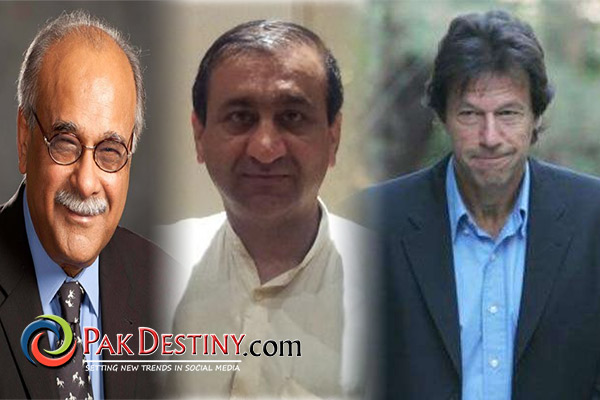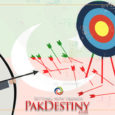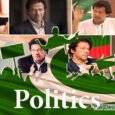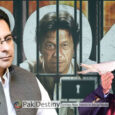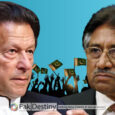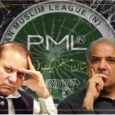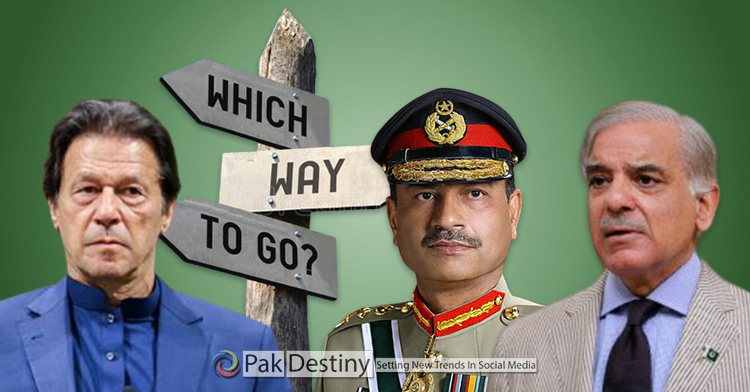
By Raza Ruman
Pakistan has been on cross roads. Where this country heading in 2O23, even a vendor can predict. Columnist Zain Siddiqui in Dawn writes aptly about the situation Pakistan is in today.
Talking of three-and-a-half years of bungled policymaking of Imran Khan.
“Inability to keep focus or last a week without controversy had left his government at the weakest it had ever been. The alarm bells had been ringing for the economy, with inflation at a 21-month high even before the year got underway. Importantly, the civil-military ‘same-page’ had been cast in the shredder ever since Mr Khan left Gen Bajwa redfaced by resisting the appointment of new ISI chief Lt Gen Nadeem Anjum just months earlier.”
He further writes “With nothing else going for him, there were fears that Mr Khan would seek to extend his grip on power by appointing a sympathetic army chief. The opposition, long made to suffer under Mr Khan’s self-serving accountability policies, could not afford such tabdeeli, and moved to strike. Politically isolated, the prime minister broke every rule to fight back. He unsuccessfully tried to win back the military’s favour, even offering Gen Bajwa an indefinite extension for his assistance in thwarting the PDM. When his advances were spurned, Mr Khan made cunning use of an American official’s diplomatic faux pas to regain his lost legitimacy. In a vast public gathering at the end of March, Mr Khan made the startling claim that an all-powerful, shadowy international cabal had been pulling strings to get him ousted. Then, in the last bid to thwart his opponents, he upended the Constitution by having the vote of no-confidence against him thrown out without a vote. Even after he failed to block his ouster, Mr Khan continued to fight, turning the guns on everyone who dared oppose him by implicating them in his ‘foreign conspiracy’ narrative. The strategy paid off, and then some. The rest, as they say, is history.”
For the ‘crime’ of staying ‘neutral’ while his political opponents were plotting his downfall, Imran Khan punished the armed forces — and especially the army chief — unsparingly after his ouster. He started with muted regrets and complaints, but by the end of the year was criticising Gen Bajwa as one of the biggest mistakes he had made in his life. With some within the institution also reportedly unhappy over the decision to let the PDM walk back into power, the establishment could not do much without inviting renewed scrutiny and fierce criticism. Therefore, while the army’s decision to distance itself from politics may have initially been a punitive one, meant to teach Mr Khan a lesson for his noncompliance, it thereafter became necessary to stick to as well.
Mr Khan ultimately may not have managed to get the concessions he sought — an early election or a say in the army chief’s selection — but he was wildly successful in orchestrating the miraculous revival of the PTI and making it, at least at the moment, the leading contender to form the next government. Luck, too, favoured him, gifting him new reasons to stage a comeback every time he was down and out. After the ouster, it was the aforementioned ‘foreign conspiracy’ mantra that kept him alive. Then, after Haqeeqi Azadi March I failed, a massive hike in fuel prices and toughening economic conditions all but ensured the PTI’s subsequent victories in by-polls. Finally, when he failed to influence the army chief’s appointment, renewed concerns regarding the country’s default risks brought him right back to relevance.
Squandering its chances
On the other hand, despite starting the year in a position of considerable strength, the PDM parties struggled thereafter. The rainbow coalition’s only notable political achievements remained the PTI’s democratic ouster, the appointment of a ‘safe’ choice as army chief, and legislation to ensure NAB will never be a problem for its leaders again. In return for these modest gains, the PDM — and especially the PML-N — paid dearly in terms of the substantial political capital and goodwill they lost ahead of an election year.
Politically, the PDM failed to keep up with Mr Khan. While it was still celebrating the PTI government’s fall, Mr Khan was already two steps ahead on the campaign trail, calling for snap polls. Then, realising it was unprepared to match him, the PDM refused to ‘give in’ to his demand for early elections even though it had at the time been in a position of relative strength. It thereby squandered what was, in retrospect, its best chance to secure a larger mandate. The government at multiple points tried to defend the decision to complete its tenure as one that was difficult but required to get the economy back on track. However, it failed spectacularly to deliver on that end as well.
The PDM also weakened its credibility greatly by failing to read the public mood. It slaughtered the ‘vote ko izzat dau’ mantra at the altar of expediency. While anger was growing over the worsening economic conditions, it took a sledgehammer to the country’s accountability laws. In doing so, it played right into Mr Khan’s narrative, who was able to use its shambolic ‘reforms’ to bolster his claim that the new government’s intention was never to ‘fix’ the economy but to secure another NRO. Each new reprieve the PDM leaders and their families got thereafter made them seem, at least to a citizenry growing rapidly disillusioned, guiltier than before.
Having failed to counter Imran Khan politically, the PDM pursued other means to knock out the PTI leader. For this reason, the limelight frequently swung to the ECP’s verdict in the PTI foreign funding case, the Toshakhana gifts controversy, contempt cases, and a slew of other cases, including those concerning attacks on state institutions, etc. However, though these challenges undoubtedly caused substantial embarrassment to the PTI chief and embroiled him even deeper in litigation, they had, by the end of the year, proved insufficient in significantly denting his popularity or removing him from the picture.
Given the matter’s centrality to last year’s politics, the tussle over who should be appointed the new army chief was always going to be bitter. Mr Khan initially insisted that if he was not allowed to make the appointment, neither should the PDM. Matters became particularly tense after he started pushing the narrative that anyone appointed with the blessing of Nawaz Sharif and Asif Zardari would only be there to protect their corruption. Fearing that the new chief might be tainted even before he assumed power, the establishment fielded the DG ISI himself to blunt Mr Khan’s attack and remind him of his follies in the past. However, that press conference was a bad move which only added fuel to the fire started by the assassination of journalist Arshad Sharif in Kenya, and which was made worse by the subsequent failed attempt on Mr Khan’s life.
As it became clear the PDM was not about to go anywhere, Mr Khan then pushed a deal to have Gen Bajwa carry on till a new government could be brought in. The outgoing chief himself seems to have supported the proposition, but it found no buyers in the PML-N, which remained intent on thwarting the PTI chief at every turn. Ultimately realising that he could not continue to fight over the matter without forever prejudicing his relations with the future chief, Mr Khan softened his stance and even managed to symbolically give the government’s choice his blessing as well.
Having lost the appointment card, Mr Khan turned his attention back to politics, with a final threat to blow up the political order through the dissolution of the Khyber Pakhtunkhwa and Punjab assemblies. However, he left the door open for the opposition to block the dissolution, and they proceeded to oblige. That is where the year ended — in stalemate, and with each side determined to out-manoeuvre the other.
I think the military establishment needs to think and fix matters before it is too late. PAK DESTINY

